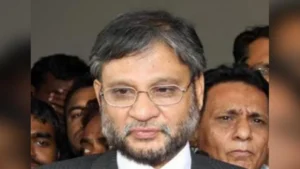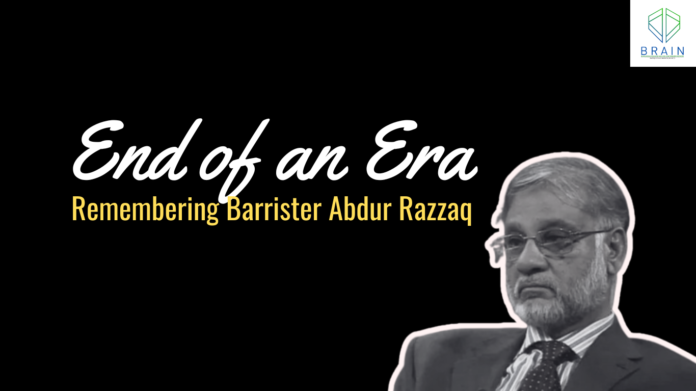- Professor Nakibur Rahman
It was probably sometime in 1988 or 1989, I am not sure. We used to live right across from the central office of Jamaat-e-Islami. I was 11 or 12 years old at that time. My father, Mr. Matiur Rahman Nizami, was getting in a car to go to the airport for his trip to the UK. We were seeing him off. Along came a tall and handsome man wearing a dress suit.
My father greeted him with salam and jokingly said, “Are we ready, barrister Saheb”?
He nodded. Then my father mentioned that he was not carrying a briefcase, and Barrister Abdur Razzaq replied, “I will be your briefcase.”
That was my first introduction to Barrister Abdur Razzaq. Unfortunately, I didn’t get an opportunity to know him better or get closer to him until 2013.

In the summer of 2013, Barrister Abdur Razzaq was visiting the United States. I had just finished my PhD and had some free time. So, I volunteered to accompany Barrister Razzaq for his meetings in New York and Washington DC. We were scheduled to meet the Assistant Secretary General of the UN. I was a little nervous about it, but Barrister Razzaq calmed me down and then asked me if I had a notebook with me. I didn’t, so we had to stop at Staples to buy a notebook, and he told me to take notes at the meeting. After the meeting, we exchanged notes. He explained the importance of note-taking and exchanging it to get a 360-degree view of any meeting.
Then we went to Washington DC for several meetings. I found him preparing for every meeting thoroughly. He would get all possible information about the individual we were meeting and brief us. Before leaving his hotel room, he would always offer two rakat prayers and ask Allah for guidance. While I drove him from meeting to meeting or get stuck in DC traffic, he would get a copy of the Quran from his briefcase and recite. He would not waste any time. He would take advantage of every waking moment to do something productive.
After a week full of hectic meetings, Barrister Abdur Razzaq left for Dhaka, but he gave me some assignments to follow up after his departure. Since then, I have been dragged into advocacy along with my day job of teaching. Often, I had to drive 5-6 hours one way from my house to DC on a weekly basis and my inspiration was Barrister Abdur Razzaq. He showed me the ropes, mentored me, and trusted me with responsibility.
On the 18th of December 2014, a few days after Shahid Abdul Qader Molla was executed by Hasina, I received a call from Barrister Abdur Razzaq that he was boarding a flight enroute to Washington D.C. He gave me the flight information and asked me to meet him at the airport. His conversation was as usual, I didn’t sense anything unusual when I was talking to him, I thought that it was going to be just another busy trip in Washington DC. But when he landed and I picked him up in my car, I noticed he didn’t have any luggage except a carry-on rollerboard. When I started driving, he broke the sad news that he was forced to leave Bangladesh, and he probably would not be able to go back anytime soon. He was saying that in such a calm voice, without any regrets or worry, which shows the level of his conviction and faith. I was driving, but tears ran down my cheeks. The exile life of Barrister Abdur Razzaq began.
Since then, he split his time between the US and the UK. But every time he was in the US, I was his go-to person. I accompanied him everywhere. I literally spent time with him if he was awake. The more time I spent with him, the more respect and love I developed towards him.
When you stay away from home for a long time, it often becomes difficult. Barrister Abdur Razzaq was very particular about his health. He would always eat healthily and walk at least an hour every day. He would always remind me, “If you don’t take care of your health, no one else will”.
Barrister Abdur Razzaq was an avid reader. I would take him to Barnes & Noble, and he would spend hours picking up books. He once asked me if I could find the books President Obama loves to read. In many meetings, he would ask his friends what book they are reading and later ask me to get those books for him. He would always carry a few books and read them whenever he got some free time. Sometimes he would ask me about some “American metaphor” that he was not familiar with while reading. One day he was reading but couldn’t make sense of “Monday morning Quarterback”. With great pleasure, I explained American football to him. Another time, he couldn’t make sense of the “Chips have fallen” metaphor. With slight hesitation, I told him it is a gambling terminology, he laughed. But by far his favorite book was the Quran. He had many sticky notes on different pages of the Quran that he used to read and share with me his understanding.
He had an amazing ability to listen patiently. In many meetings, I witnessed outrageous and disrespectful comments made by individuals that would make my blood boil, but I never saw him get angry. Rather, he would ask me if I had noted that down. This is a rare trait. I wish more politicians would listen to things that they are not comfortable with.
I am not saying Barrister Abdur Razzaq never got angry, but it was rare. One time we were walking in Washington DC because we had to park our car far away. We were running a bit late for our appointment, so I was almost running, and we were met with traffic signals. There was light traffic, and we could cross the road, but since the “Don’t Walk” sign was posted, he didn’t like that I started walking. He was a little angry at me and told me never to break the law, even if it is as harmless as “Jaywalking”. That tells me a lot about the type of person he was and the level of his integrity.
When you spend so much time together, you share a lot of things. Barrister Abdur Razzaq told me stories about my father that I did not know. He told me a story that in 1972 Barrister Abdur Razzaq was going to attend an International Youth conference in Dubai, but he didn’t have a suit, so my father went out at night to buy a suit for him. Also, when he decided to leave his practice in London and come back to Bangladesh, my father received him at the Dhaka airport in 1986.
He told me that story very casually as if it were not a big deal. But those of us who live in the West know how hard it is to give up a career and a safe and secure life in the West. Some other time, he told me, when he decided to leave London, his practice was booming. In his own words, “Money was coming through the door, through the window, through the A/C vent”. He left all that for a deep conviction; to help the ideology he believed in and spend all his waking moments trying to do the right thing.
We had hours of conversation about many things. We did not always agree, but even when we disagreed, he accepted with such grace that is rare. After COVID, he didn’t come to the US much. His last visit was in the summer of 2023. It was a very short visit for him. It was probably the only time that I didn’t get an opportunity to see him, but we spoke. I did not know that I wouldn’t be able to see him again; otherwise, I would have dropped whatever I was doing and seen him.
Today, May 4, 2025, He left this world; he left all of us. But Bangladesh, his passion project, will remain with us forever; I am happy for him that after the July Revolution, he got the opportunity to end his exile and return to his beloved Bangladesh. He gave everything he had for Bangladesh; he gave everything he had for the ideology he believed in, and he earned the respect of his peers across the entire spectrum of political ideology in Bangladesh. I will miss you Barrister Abdur Razzaq Chacha. Bangladesh will miss you. It is the end of an Era.
I pray to Allah swt that Allah accepts all your good deeds, forgives all your shortcomings, and grants you the highest Jannah. Ameen.
[Professor Nakibur Rahman is a Professor of Finance at the University of North Carolina, USA]

